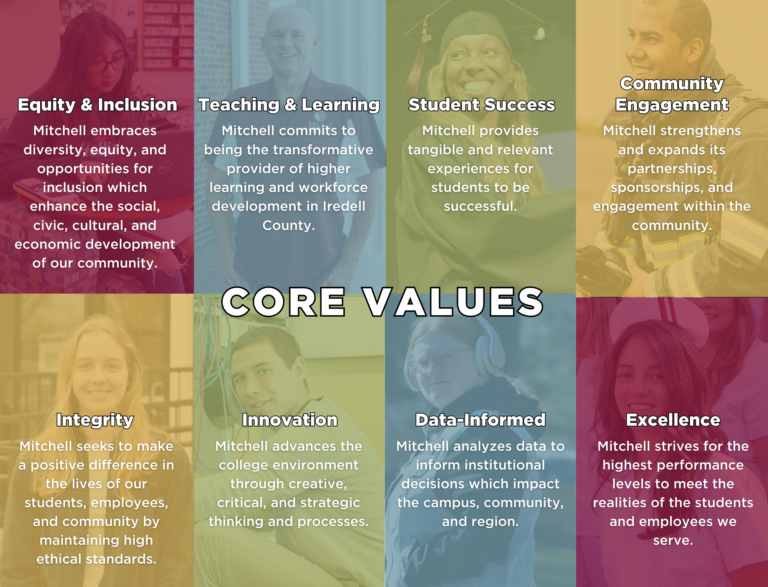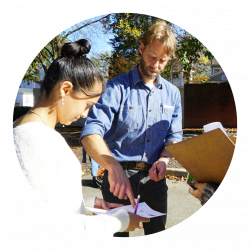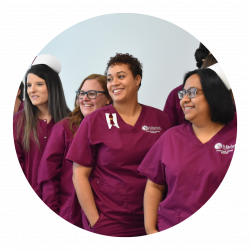Core Values, Priorities & Goals
Mitchell Community College 2023-2028 Strategic Plan: Mitchell Empowers Futures
By understanding this evolving role of the College, Mitchell can better facilitate student success through the implementation of equitable, accessible education infrastructures while also engaging with an inclusive campus culture that adapts to meet the business, industry and community needs.
With the 2023-2028 strategic plan, Mitchell Empowers Futures for current and prospective students.
Core Values

Priorities
By understanding this evolving role of the College, Mitchell can better facilitate student success through the implementation of equitable, accessible education infrastructures while also engaging with an inclusive campus culture that adapts to meet the business, industry and community needs.
With the 2023-2028 strategic plan, Mitchell Empowers Futures for current and prospective students.
Inspiring Teaching and Learning
Achieving Social and Economic Mobility
Thriving with Partnerships
Each priority has goals that align with measurable strategies which guide the work that the College does. Our plan is shared with the campus community to encourage active engagement with a one-college model.
Priority #1
Inspiring Teaching & Learning
Mitchell remains committed to being the premier transformative provider of higher learning and student success in Iredell County and the surrounding areas. Through exceptional instruction, innovative educational approaches, enriched learning environments, and meaningful experiences, Mitchell can inspire our students to achieve their goals and realize success.
- Goal 1.1: Creating Relevant Pathways
- Goal 1.2: Improving Student Success
- Goal 1.3: Providing Professional Development
- Goal 1.4: Modernizing Learning Environments
Create innovative educational pathways that are responsive and aligned to student needs.
Strategy 1.1.1:
Identify local stakeholders’ needs to align instructional experiences with essential skills outlined by stakeholders.
Strategy 1.1.2:
Introduce new short-term educational pathways to complement degree-seeking pathways.
Strategy 1.1.3:
Investigate, develop, and offer, as needed, bilingual educational pathways and/or courses.
Enhance resources to increase enrollment, retention, persistence, and goal completion in all student populations served.
Strategy 1.2.1:
Implement a new strategic enrollment management plan focusing on student success and goal completion.
Strategy 1.2.2:
Employ a proactive advising model that aligns with the core values and competencies for academic advising set by the National Academic Advising Association (NACADA) to encourage student success, foster progression, and promote completion of credentials.
Strategy 1.2.3:
Apply innovative teaching and learning approaches to improve student performance and success.
Strategy 1.2.4:
Invest in software platforms to enhance student retention, persistence, and completion.
Strategy 1.2.5:
Employ and utilize Career Coaches, Early College, and Transition Liaisons in high schools to prepare students for college, military, or workforce entry.
Recruit, retain, and maximize human and technological resources to propel optimal performance and operational excellence that reflects acceptance and values diversity.
Strategy 1.3.1:
Ensure all college employees have professional learning opportunities to promote personal and professional growth.
Strategy 1.3.2:
Develop and realize a Center for Teaching and Learning to enhance teaching innovation and excellence.
Strategy 1.3.3:
Attract and retain employees to create a college environment that reflects the diverse demographics of Iredell County.
Establish and sustain technologically advanced, inclusive learning environments that promote collaboration.
Strategy 1.4.1:
Establish an inclusive learning ecosystem by creating efficient processes and innovative infrastructures facilitating student and campus success.
Strategy 1.4.2:
Research and establish a comprehensive digital campus.
Strategy 1.4.3:
Maintain a safe and secure college environment that proactively addresses potential risks to the campus.
Priority #2
Achieving Social & Economic Mobility
Mitchell prepares students for meaningful employment by offering well-structured program pathways that are regularly updated in collaboration with our area school systems, higher education, business, and industry partners. These pathways are designed to empower individuals, enabling them to achieve social and economic mobility as they progress toward their goals.
- Goal 2.1: Expanding Student Access
- Goal 2.2: Creating Innovative Pathways Leading to a Sustainable, Living Wage
- Goal 2.3 Facilitating Students’ Understanding of the Importance of Transferable Skills
Design and execute targeted educational opportunities, leading to transformative social and economic mobility for all individuals.
Strategy 2.1.1:
Recruit and maintain a student population representative of Iredell County’s demographics.
Strategy 2.1.2:
Coordinate initiatives in Iredell County to increase the proportion of student credential attainment.
Strategy 2.1.3:
Reduce student barriers by providing financial support for our students.
Create and implement innovative pathways that prepare individuals with the skills, knowledge, and opportunities necessary to secure sustainable employment that offers a living wage.
Strategy 2.2.1:
Analyze the labor market to design and promote pathways that align with the local workforce needs and provide graduates with a sustainable living wage.
Strategy 2.2.2:
Communicate and execute policies for prior learning experiences to increase student enrollment, success, and timely completion of credentials.
Facilitate students’ understanding of the significance of transferable skills and their role in achieving success in college, their careers, and all aspects of life.
Strategy 2.3.1:
Define transferable (soft) skills and construct a general education outcome to be implemented and assessed.
Strategy 2.3.2:
Integrate transferable (soft) skill development and alignment with learning experiences in courses, student activities, and workshops.
Strategy 2.3.3:
Design and incorporate a transferable (soft) skill micro-credential in educational pathways.
Priority #3
Thriving With Partnerships
Mitchell cultivates flourishing partnerships that foster collaborative efforts with Iredell County’s Economic Development Corporation Board, schools, local industries, organizations, and community stakeholders. This unwavering commitment to collaboration ensures that Mitchell continues to thrive by providing diverse traditional and non-traditional pathways and services, ultimately guiding its students, the College, and the community toward success.
- Goal 3.1: Enhancing Economic and Workforce Development
- Goal 3.2: Strengthening Community Engagement and Sponsorships
- Goal 3.3: Engaging With Other Educational Institutions
Facilitate students’ understanding of the significance of transferable skills and their role in achieving success in college, their careers, and all aspects of life.
Strategy 3.1.1:
Ensure seamless and comprehensive access to student apprenticeships, internships, and work-based learning programs.
Strategy 3.1.2:
Collaborate with career & technical education personnel in public school units to provide opportunities for career exploration, development, and summer enrichment programs for middle and high school students.
Strategy 3.1.3:
Launch a Career Development Center committed to nurturing students’ professional growth and facilitating their progression in the workforce.
Develop outreach, engagement, and community-focused initiatives that produce positive outcomes across all segments of our service area.
Strategy 3.2.1:
Establish new partnerships with local and regional support agencies.
Strategy 3.2.2:
Encourage and support employees to serve on local community/business advisory boards and commissions.
Strategy 3.2.3:
Enhance donor relationships to drive impactful fundraising by identifying and cultivating new donors while maintaining stewardship of existing supporters.
Establish partnerships with public school units and higher educational institutions to launch pathways that transform generational knowledge and success.
Strategy 3.3.1:
Execute strategic memorandums of understanding (MOUs) and local articulation agreements in collaboration with each public school unit, facilitating the seamless integration of educational pathways for students that lead to sustainable living wage careers.
Strategy 3.3.2:
Enact seamless pathways with other higher educational institutions leading to associate or bachelor’s degree completion for students.





